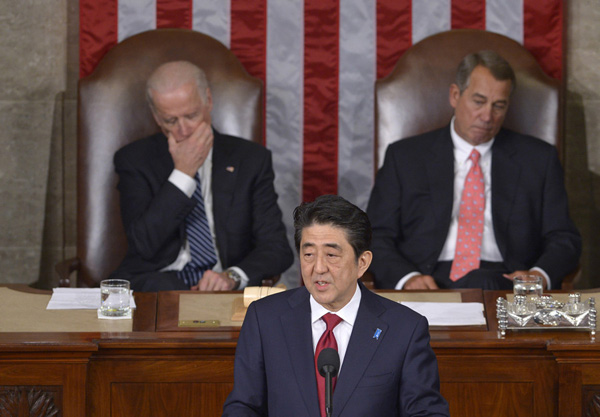

 |
| Japanese Prime Minister Shinzo Abe (C) addresses a joint meeting of Congress on Capitol Hill in Washington D.C., the United States, April 29, 2015. (Xinhua/Yin Bogu) |
Japanese Prime Minister Shinzo Abe's address in the US Congress could be seen as "historic" in its indication that Japan would no longer offer a heartfelt apology to Asian neighbors victimized by its brutal aggression and colonial rule during WWII.
Abe claimed that the postwar path Japan has been pursuing is based on "deep remorse" over the war and Japan's "actions" brought "suffering to the peoples in Asian countries." "We must not avert our eyes from that. I will uphold the views expressed by the previous prime ministers in this regard," he told a joint session of the US Congress.
In the well-prepared speech delivered to US lawmakers, Abe, however, unveiled his revisionist ideology by using "actions" instead of "aggression and colonial rule," and "deep remorse" rather than "heartfelt apology," in an apparent effort to dilute the country's wartime atrocities.
Abe's planned statement on the occasion of the 70th anniversary of the end of WWII this summer has already triggered concerns from neighboring China and South Korea since the hawkish leader hinted that he will not repeat the key terms used by his predecessors.
It is also giving clearer clues about what Abe will talk about months later at home. With applause in the US Capitol, Abe believes he has got Washington's acquiescence in his high-profile address to cripple the much-recognized 1995 Murayama statement.
What should top the US agenda in Asia is to encourage Japan to reconcile with its neighbors, rather than indulge in its "pivot to Asia" in an irresponsible way and further embolden the right-leaning Abe government, either intentionally or unintentionally.
Such miscalculations will risk the peace and stability of the entire region, and escalating tensions between Japan and its neighbors will also jeopardize US interests.
The Japanese leader must also understand that Japan, as a country that inflicted tremendous pain and damage to Asia during WWII, should first seek reconciliation with its Asian neighbors.
Unfortunately, the two allies are heading in the misguided direction indicated by a newly-revised defense guideline, which will allow Abe to upgrade Japan's Self-Defense Forces to handle disputes with its neighbors and meddle in regional affairs in a saber-rattling way.
By not offering an apology, Japan lost another chance to mend ties with its neighbors, thus clouding the future in East Asia.
 J-11 fighters in air exercise
J-11 fighters in air exercise Beauties dancing on the rings
Beauties dancing on the rings Attendants-to-be join Mr. & Miss Campus Contest
Attendants-to-be join Mr. & Miss Campus Contest Beijing's toughest anti-smoking law takes effect
Beijing's toughest anti-smoking law takes effect Family lives in cave for about 50 years in SW China
Family lives in cave for about 50 years in SW China PLA soldiers operating vehicle-mounted guns in drill
PLA soldiers operating vehicle-mounted guns in drill Blind carpenter in E China's Jiangxi
Blind carpenter in E China's Jiangxi China hosts overseas disaster relief exercise for the first time
China hosts overseas disaster relief exercise for the first time 20 pairs of twins who will become flight attendants in Sichuan
20 pairs of twins who will become flight attendants in Sichuan Obama is sowing discontent in S.China Sea
Obama is sowing discontent in S.China Sea Rescuers work through night to reach cruise ship survivors
Rescuers work through night to reach cruise ship survivors Driving through limbo
Driving through limbo Facing down MERS
Facing down MERSDay|Week